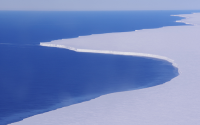Breadcrumb
News archives

Study Uncovers Surprising Melting Patterns Beneath Antarctica's Ross Ice Shelf
Casts new light on threats to Antarctica’s largest ice shelf

Around the Pier: Usurp the Burp
How seaweed could help curb cow burps—one of California’s greatest sources of methane emissions

Research Highlight: Rapid Global Switch to Renewable Energy Can Save Millions of Lives Annually
Scientists assess impact of fossil energy and air pollution on health, climate and rainfall

Rapid Global Switch to Renewable Energy Can Save Millions of Lives Annually
Scientists assess impact of fossil energy and air pollution on health, climate and rainfall

A Scientist's Life: Helen Amanda Fricker
Glaciologist uses satellite data to monitor one of the most significant global warming-related changes in nature

Research Highlight: Deep Ocean Warming at an Accelerating Rate
Measurements made from ships and by Scripps-built robots both point to more heat uptake than expected

New Scale to Characterize Strength and Impacts of Atmospheric River Storms
Similar to scales gauging hurricane, wind, or tornado intensity, could aid flood response and water management, especially in the West

Around the Pier: Bringing Science to Global Climate Talks
Large delegation of students and researchers from Scripps Oceanography and University of California participate in COP24 climate conference in Poland

How Marine Life Responds to Upheaval
Recent episode in Antarctica set off a chain of ecological events and offered a study in resilience

45 UC San Diego Faculty Named Most Influential in Their Fields
Three Scripps Oceanography faculty named in new listing of highly cited researchers

New Sea-Level Rise and Flood Alert Network Launches with City of Imperial Beach
Gift from the David C. Copley Foundation funds Scripps Institution of Oceanography pilot observation system to support vulnerable coastal communities with adapting to climate change

A Scientist's Life: Kate Ricke
Climate scientist talks about how she models the societal risks posed by climate change

Around the Pier: NASA Launches World's Most Advanced Ice-Measuring Satellite into Orbit
Glaciologist Helen Fricker and other Scripps scientists played a role in advising the ICESat-2 mission

Human Causes Only Plausible Source of Warming in Southern Ocean
Synthesis of observational data and models shows trend not due to natural variability

Scripps Scientists Recognized by American Geophysical Union
Helen Amanda Fricker and Lynn Russell named AGU Fellows; Richard Somerville to receive AGU Ambassador Award

Scientists Find Corals in Deeper Waters Under Stress Too
Scripps researchers use novel approach to assess temperature stress on deep coral reefs in Palau, combining sea level and temperature data sets from continuous recorders serviced by divers

Scripps Alumna and Sally Ride Science Instructor to Embark on Arctic Expedition
Cynthia Matzke, MAS '14, will study climate issues and engage in outreach to build an understanding of environmental changes and Inuit culture
Pagination
Sign Up For
Explorations Now
explorations now is the free award-winning digital science magazine from Scripps Institution of Oceanography. Join subscribers from around the world and keep up on our cutting-edge research.







